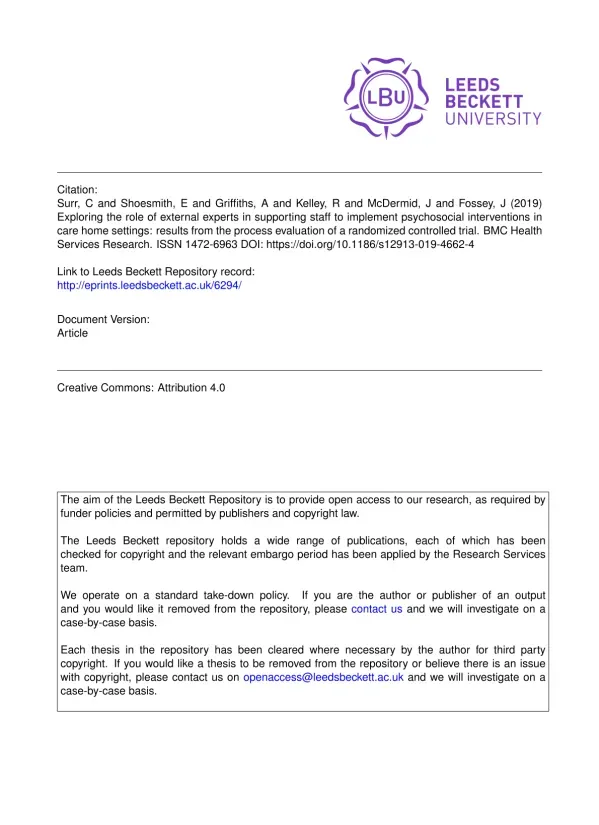
The Role of External Experts in Implementing Psychosocial Interventions in Care Homes
Document information
| Author | Claire A. Surr |
| School | Leeds Beckett University |
| Major | Health and Community Studies |
| Year of publication | 2019 |
| Place | Leeds |
| Document type | article |
| Language | English |
| Number of pages | 33 |
| Format | |
| Size | 392.78 KB |
- psychosocial interventions
- dementia care
- external expert support
Summary
I. Introduction
The implementation of psychosocial interventions in care homes is crucial for enhancing the quality of care provided to individuals with dementia. However, many staff members lack the necessary training and preparation to effectively carry out these interventions. The role of external experts emerges as a significant factor in bridging this gap. This section explores the necessity of expert support, highlighting that staff often face challenges due to inadequate training and high turnover rates. The document emphasizes that external experts can provide essential guidance and resources, which are vital for successful implementation. As noted in the study, 'Expert support was vital for successful DCM implementation.' This underscores the importance of having knowledgeable individuals who can assist care home staff in navigating the complexities of psychosocial interventions.
II. Methodology
The study employed a multi-method approach within a process evaluation framework, focusing on the Dementia Care Mapping (DCM) intervention. Interviews were conducted with six external experts, 17 care home managers, and 25 staff members responsible for DCM implementation. This diverse data collection method allowed for a comprehensive understanding of the perceptions surrounding external expert support. The analysis revealed three primary themes: the need for expert support, practicalities of support, and broader impacts of providing support. The findings indicate that while external experts are crucial, the support provided must be tailored to meet the specific needs of each care home. The study's methodology highlights the importance of qualitative insights in understanding the dynamics of care home environments.
III. Key Findings
The research identified significant themes regarding the role of external experts in care homes. Firstly, the need for expert support was emphasized, as many staff members felt unprepared for implementing psychosocial interventions. The study found that the five days of support provided were often insufficient, leading to feelings of inflexibility and unmet individual needs. Secondly, practical challenges arose from geographical distances, which limited the availability of support. The experts themselves gained valuable insights that they could apply in training sessions, enhancing their effectiveness. The findings suggest that external experts play a pivotal role in facilitating successful implementation, yet their impact is contingent upon the adequacy and adaptability of the support provided.
IV. Implications for Practice
The implications of this study are profound for the future of care home practices. The presence of external experts can significantly enhance the implementation of psychosocial interventions, leading to improved care outcomes for residents. The document suggests that ongoing support from these experts can foster a culture of learning and development within care homes. As stated, 'Experts were not able to accurately predict which homes would be able to implement DCM independently in future cycles.' This highlights the need for continuous evaluation and adaptation of support strategies. The findings advocate for a structured approach to integrating external experts into care home settings, ensuring that staff are adequately supported and empowered to deliver high-quality care.
V. Conclusion
In conclusion, the role of external experts in implementing psychosocial interventions in care homes is critical. The study underscores the necessity of expert support in overcoming barriers to effective implementation. Future research should focus on optimizing the use of the expert role, ensuring that care home staff receive the tailored support they need. The insights gained from this research can inform policy and practice, ultimately leading to better care for individuals with dementia. The document serves as a valuable resource for understanding the dynamics of care home interventions and the essential role of external experts in enhancing care quality.
Document reference
- Exploring the role of external experts in supporting staff to implement psychosocial interventions in care home settings: results from the process evaluation of a randomized controlled trial (Surr, C and Shoesmith, E and Griffiths, A and Kelley, R and McDermid, J and Fossey, J)
- Reducing neuroleptic medication use in care homes (Fossey et al.)
- Staff training and action planning toolkit with ongoing implementation support (Edwards et al.)
- Successful implementation of an end-of-life care programme in nursing homes
- External expert experiences in care home settings (Fossey and colleagues)
